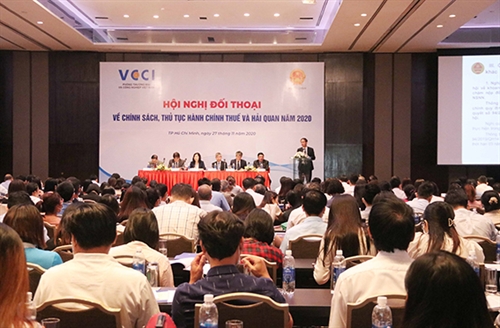Bui Duc Giang
Attorney at law and PhD in law[1]
Guarantees are personal security recognized by the general law of security. The security is used both in the context of corporate financing and retail banking. Civil Code 91/2015/QH13 dated November 24, 2015 (the Civil Code) creates the general law for this security interest of which this article tries to provide an overview.
 |
| Conducting transactions at BAOVIET Bank’s Dak Lak branch__Photo: VNA |
Legal framework applicable to guarantees
Generally speaking, guarantees are governed by three main separate sets of rules. The general law of guarantees is contained in Articles 335 and seq. of the Civil Code. Guarantees issued by banks named bank guarantees are regulated by Law 47/2010/QH12 dated June 16, 2010, on Credit Institutions as amended in 2017, and the State Bank’s Circular 07/2015/TT-NHNN dated June 25, 2015, as amended in 2017, and Government guarantees issued by the Ministry of Finance are subjected to Law 20/2017/QH14 on public debt management dated November 23, 2017, Government Decree 91/2018/ND-CP on provision and management of Government guarantees dated June 26, 2018, and the Ministry of Finance’s Circular 58/2018/TT-BTC dated July 10, 2018, guiding forms for providing information and making reports with respect to programs and projects guaranteed by the Government. It is noteworthy in relation to bank guarantees that they are rather suretyship guarantees triggered by default on the part of the principal debtor and may not be in the form of first demand guarantees widely used in international commerce. Furthermore, when a bank guarantee is provided in a particular context (e.g., tender participation guarantee or import-export duties payment guarantee), it may be made subject to specific rules contained in specialized laws and regulations.
Guaranteed obligations
Article 336.1 of the Civil Code provides that “the guarantor may undertake to guarantee all or part of the principal debtor’s obligation”. As such, a loan may be partially or wholly guaranteed.
There may be a specific limit in a guarantee on the amount which may be recovered under it. The precise form of the limitation will impact on the rights of the lender under the guarantee. Typically, a limited guarantee will specify either that the guarantee is granted in respect of all of the principal debtor’s relevant obligations, but with an overriding limit on the amount that the lender may recover from the guarantor. As an alternative, the guarantee could provide that it is simply a guarantee of only part of the principal debtor’s obligations.
The lender should also insist in the guarantee covering the principal debtor’s obligation under any amendments or variations to the loan agreement.
Under Article 336.2 of the Civil Code, “a guaranteed obligation shall include interest on the principal, penalties, damages and interest on the overdue amount, unless otherwise agreed”.
Article 336.4 further prescribes that, “in case the guaranteed obligation is an obligation arising in the future[2], the scope of the guarantee does not cover any obligation arising after […] the corporate guarantor ceases its existence”. This means that the lender will lose its security with regard to any loans taken out after the cessation of the corporate guarantor’s existence (i.e., in case of its dissolution, bankruptcy or certain cases of its restructuring).
In case the guarantor is a company wholly owned by the State, the aggregate amount of all guarantees for all loans taken out by one subsidiary wholly owned by it shall not exceed the equity of that subsidiary indicated in the latest quarterly or annual financial statements; and the aggregate amount of all guarantees for all loans taken out by a subsidiary 50 percent or more of its charter capital is held by it shall not exceed the amount of capital actually contributed by it at the time of provision of the guarantees (Article 23.4 of Law 69/2014/QH13 on management and use of State capital invested in the production and business of enterprises dated November 26, 2014, as amended in 2018).
It should be also noted that Article 341.1 of the Civil Code provides that “where a guarantor is required to perform his liability which the beneficiary discharges him from performing, the principal debtor shall not be required to perform the obligation towards the beneficiary, unless otherwise agreed by the parties or otherwise provided by law”.
Nature of the guarantor’s undertaking
Article 335.1 of the Civil Code provides that “a guarantee is an undertaking made by a third person (the guarantor) to a creditor (the beneficiary) to perform an obligation in lieu of the debtor (the principal debtor) if the obligation falls due and the principal debtor fails to perform or incorrectly performs it”.
This definition implies that the beneficiary may only request the guarantor to perform the guaranteed obligation in lieu of the principal debtor in case the latter breaches this obligation. This rule has been reiterated in Article 342.1 of the Civil Code pursuant to which “where the principal debtor fails to perform or incorrectly performs the obligation, the guarantor must perform such obligation”.
Furthermore, Article 339.2 of the Civil Code provides “the beneficiary may not request the guarantor to perform the obligation in lieu of the principal debtor if such obligation has not become due”. Reading these provisions together, it can be inferred that the guarantee can only be called if:
- the guaranteed obligation has become due[3]; and,
- the principal debtor has breached it.
As for the guarantor’s liability, under Article 342 of the Civil Code, “where the principal debtor fails to perform or performs incorrectly the obligation, the guarantor must perform such obligation. Where the guarantor fails to perform correctly his liability, the beneficiary shall have the right to request the guarantor pay the value of the breached obligation and compensate for any damage caused by his breach”.
The nature of the guarantor’s undertaking as analyzed above shows that the guarantee is quite efficient for banks. Unfortunately, the current law is lacking efficient guarantor protections.
Article 336.3 of the Civil Code recognizes that the parties may agree that the guarantor’s liability is secured by a security interest on property. The most common scenario is that the guarantor creates a charge or pledge over his assets to secure his liability.
Guarantee instruments
The Civil Code does not provide for the forms in which a guarantee may be contained. Therefore, it can be provided in writing or verbally. It needs not to be either notarized or authenticated to ensure its enforceability.
In practice, it would be highly unusual for a guarantee in a corporate financing transaction not to be in writing in line with Article 119 of the Civil Code.
It is not strictly necessary for the lender to sign the guarantee instrument itself. Provided the lender has acted upon the guarantee, the guarantor will be bound by the terms and conditions of the guarantee regardless of the lender’s failure to sign. The principal debtor is not required to execute the guarantee.
The guarantee may take the form of a letter issued by the guarantor, an agreement between the guarantor and the lender or a tripartite agreement between the guarantor, the lender and the principal debtor. To be valid, those guarantee instruments must in all cases contain the guarantor’s undertaking to perform the guaranteed obligation in lieu of the principal debtor.
When the guarantee is in the form of a letter issued by the guarantor, it qualifies as a unilateral agreement under Articles 402.2 and 409 of the Civil Code. Reading those articles together with Article 421.1 of the Civil Code, it can be inferred that the guarantor may not revoke or early terminate the guarantee without the consent of the beneficiary.
As a guarantee is a contract, it is subject to the normal rules for creating, interpreting and enforcing contracts.
A guarantee is an accessory contract, not a primary contract (Article 407.2 of the Civil Code).
Enforcement
Given the nature of the guarantor’s undertaking, a lender’s rights to enforce a guarantee will, as mentioned above, not arise until the principal debtor has defaulted in the performance of the guaranteed obligations. In the absence of express provisions in the guarantee document itself, the liability of the guarantor will arise immediately on the principal debtor defaulting, but not earlier.
The terms of the guarantee document may require certain additional formalities to be complied with when a claim is made under the guarantee. For example, there may be a requirement (and this is usually the case) to serve a formal demand on the guarantor (and possibly the principal debtor). Any such provisions are generally viewed by the courts as conditions precedent to liability and will be interpreted strictly to the benefit of the guarantor.
There is no general law requirement that the lender take enforcement action against either the principal debtor (e.g. by enforcing a security interest over his property) or any other guarantors before claiming under a guarantee.
Co-guarantors
Pursuant to Article 338 of the Civil Code, “when more than one person guarantee an obligation, those persons must perform jointly and severally the guarantee, except where it is agreed or provided by law that the guarantee comprises separate portions. The creditor may demand any one of the co-guarantors to perform the obligation in its entirety”.
As such, co-guarantors are deemed to be jointly and severally liable for the guaranteed obligation unless the law provides for or the parties agree on the share of the common liability. In the latter case, guarantors are said to be severally liable only.
Under Article 341.2 of the Civil Code, where a guarantee is expressed to be “joint and several”, and only one of the co-guarantors is released from liability, the remaining co-guarantors will remain liable to the extent of their liability. In such case, if the lender simply agreed not to sue a co-guarantor, the remaining guarantors will continue to be liable to it.
A guarantor may claim contribution from other guarantors of the same obligation. A claim can be made if a guarantor pays in full all of the principal obligations which have been guaranteed (Article 338 of the Civil Code). The Civil Code is unclear on whether a claim may be made if the guarantor pays more than its share of those obligations, that is, the amount it would have been required to pay if all guarantors had contributed in the required shares to the payment of the guaranteed obligations.
It is possible to modify or exclude the right of contribution expressly by agreement between the guarantors. For instance, by agreeing that one guarantor will be liable for a specified amount or percentage of the guaranteed obligations and that the other guarantor or guarantors will be liable for satisfying any claim made in respect of the guaranteed obligations over that limited amount.
Termination
Article 343 of the Civil Code enumerates four types of case in which a guarantee may terminate, including (i) termination of the guaranteed obligation, (ii) cancellation of the guarantee or its replacement by another security interest, (iii) completion of the performance of the liability by the guarantor, and (iv) by agreement between the parties.
The first ground for termination is based on the principle that the guarantor’s obligations are co-terminous with those of the principal debtor. The guaranteed obligation may terminate for various reasons, for instance once the principal debtor has performed this obligation, or the beneficiary released the principal debtor from it, or in case of rescission (and more generally avoidance) of the underlying contract.
As to the fourth ground for termination, the terms of the guarantee may state that it shall terminate in case of agreement by the lender to give time to the principal debtor or if the lender and the principal agree to vary the loan without the guarantor’s prior consent. Those types of clause are obviously unfavorable to lenders.
Likewise, it can be agreed that a failure by the lender to comply with any obligation imposed on it under the guarantee may result in the termination of the guarantee. However, in a corporate financing context, it would be rare for the lender itself to undertake obligations to the guarantor as the guarantee often contains only the guarantor’s obligations.
It is a pity that Article 343 of the Civil Code fails to mention the case of termination on stated expiry. Obviously, the parties may agree that the guarantee is to expire on a specified date. In this case it is clear the guarantor will not be liable for financial accommodation made available, or committed to be made available, by the lender to the principal debtor after that date.
The question which arises is whether in those circumstances, a guarantor will be liable for financial accommodation which has been made available prior to the expiry date but which is not yet due and payable as at the expiry date. The guarantee may provide that it will continue to apply to liabilities which become due and payable after expiry of the guarantee with respect to financial accommodation provided, or committed to be provided, before its expiry.
Right of indemnity
Article 340 of the Civil Code provides that “the guarantor may demand the principal debtor to indemnify him to the extent of the obligation which has been performed, unless otherwise agreed”. It can be inferred from this provision that:
- In principle, the guarantor will have a right of indemnity from the principal obligor for the amount paid by the guarantor to the lender upon completion of payment of such amount to the lender.
- However, the guarantor may be indemnified in case he has paid only part of the guaranteed amount stated in the guarantee document.
- The guarantor and the beneficiary may contract out the right of indemnity.
- The guarantor will be refunded the amount that it has paid the beneficiary and which will not include any expenses (notably legal fees) incurred by him as a result of the enforcement of the guarantee.
Another question which arises is that from what time a claim may be made under the indemnity? The Civil Code remains silent on this point. The general position regarding time-limit for performing an obligation provided in Article 278.1 of the Civil Code is that the guarantor and the beneficiary may agree on a time limit for the principal debtor to refund the guarantor. However, what would be the case in the absence of such agreement or if the parties fail to reach it? In this regard, Article 278.3 of the Civil Code prescribes that “where it is impossible to determine the time-limit for the performance of an obligation […], either party may […] demand the performance of the obligation at any time, but must give reasonable prior notice to the other party”. May the claim be made under the right of indemnity by the giving of a reasonable prior notice to the principal debtor?
This approach is not appropriate because (i) it would not help protect the guarantor in an efficient manner that he should deserve, and (ii) it would be difficult to define what would be considered as a reasonable time for giving the notice. The guarantor would be entitled to claim under its right of indemnity from the principal debtor immediately after paying the lender.
The law should clarify those important points.
It should be borne in mind that the principal debtor shall be subject to late payment interest in case of delay in refunding the guarantor (Article 357 of the Civil Code).
Right of subrogation
In some jurisdictions such as France, the United Kingdom or Australia, after a guarantor has satisfied its obligations under the guarantee in full, the guarantor has the right to be subrogated to the lender’s rights against the primary debtor. This will include a right to enforce any security which was provided to the lender for the principal debtor’s liabilities. This is an independent right to the guarantor’s rights of indemnity or restitution, as against the principal debtor.
The Civil Code does not address the guarantor’ subrogation rights. In practice, in case of guarantees provided by an individual in favor of a lender being another individual, certain courts accept that the guarantor has the benefit of all the security interests having been taken by the lender[4]. The law should recognize this right of subrogation to better protect guarantors.
Death of the guarantor
Article 336.4 of the Civil Code indicates that “in case the guaranteed obligation is an obligation arising in the future, the scope of the guarantee shall not cover any obligation arising after the guarantor’s death”. As such, if a continuing guarantee is provided to secure future loans including ones taken out after the guarantee was put in place and after the guarantor’s death, the lender may not request the guarantor’s heirs to perform the deceased guarantor’s liability with regard to those loans.
Reading this article together with Articles 343 and 615 of the Civil Code, it appears that the deceased guarantor’s heirs will have to perform the guarantee obligations in connection to all loans taken out before the guarantor’s death unless otherwise agreed by the parties.
The corporate guarantee is made subject to insolvency procedures
Article 55.2 of Law 51/2014/QH13 on Bankruptcy (Bankruptcy Law) provides that “in case the guarantor becomes insolvent, the guarantee shall be dealt with as follows:
a/ if the guarantee obligation has arisen, the guarantor shall perform it. In case the guarantor fails to pay [the guaranteed obligation] in full within the scope of the guarantee, the beneficiary shall be entitled to request the principal debtor to pay the shortfall;
b/ If the guarantee obligation has not arisen yet, the principal debtor shall replace it by another security interest, unless otherwise agreed by the principal debtor and the beneficiary”.
As such, if the guaranteed loan becomes due and payable at the time the guarantor becomes insolvent, the guarantor must pay it, but if it has not become due and payable at that time, the guarantor will not have to make payment and the principal debtor will have to replace the guarantee by another security interest, unless otherwise agreed by the principal debtor and the beneficiary. In other words, in the second case, the guarantee shall automatically terminate[5].
Furthermore, Article 55.3 of the Bankruptcy Law sets out a principle that “in case the principal debtor becomes insolvent or both the principal debtor and the guarantor become insolvent, the guarantor shall bear the liability in lieu of the principal debtor in line with the law”. Although this article’s wording is not clear, it can be inferred that in those circumstances, the guarantor must perform the guaranteed obligation if the principal debtor has failed to do so. Article 77.3 of this law further provides that after paying [the guaranteed obligation] in lieu of the insolvent enterprise, the guarantor shall be entitled to take part in the creditors’ meeting and becomes a unsecured creditor.
The above analysis shows that the current law addresses the various aspects of guarantees and that this security interest is very favorable to its beneficiary. However, certain limitations and loopholes in the current law should be remedied to help protect guarantors and boost credit.-









